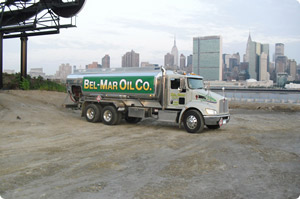Fill out this quick contact form to get in touch with Bel-Mar Oil. Need something more specific? Get in touch with us on our general contact form here.
As distributors of fine petroleum products refined by Exxon, Mobil, Texaco and Sunoco, Bel-Mar Oil cares about our customers' petroleum needs. Whether you need heating oil, kerosene or diesel fuel, or require service for your oil equipment, Bel-Mar Oil can get the job done quickly and efficiently through our radio-dispatched trucks and service vans. With our commitment to quality and service, Bel-Mar Oil wants to be your oil dealer.
Oilheat is consistent, comfortable, satisfying heat - compared to other types of heat that can leave you shivering, no matter where you set the thermostat. You can actually feel the difference Oilheat makes ... and you will love it!
Comfort is only one of the many benefits Oilheat users enjoy. The following reasons explain why so many people are building new Oilheated homes, and why so many homeowners are converting their electric, wood and propane heating systems to Oilheat.
 Oilheat has always been the efficiency leader. Heating efficiency is the amount of usable heat extracted from the potential energy of the fuel. If a heating system is 85% efficient, 85 cents of every dollar you spend goes to heat your home and hot water. Heating system efficiency is measured in AFUE, or annual fuel utilization efficiency. Today's Oilheat equipment ranges in AFUE ratings from 85% to 95%. As such, many of them receive the U.S. Department of Energy's ENERGY STAR® rating for high efficiency.
Oilheat has always been the efficiency leader. Heating efficiency is the amount of usable heat extracted from the potential energy of the fuel. If a heating system is 85% efficient, 85 cents of every dollar you spend goes to heat your home and hot water. Heating system efficiency is measured in AFUE, or annual fuel utilization efficiency. Today's Oilheat equipment ranges in AFUE ratings from 85% to 95%. As such, many of them receive the U.S. Department of Energy's ENERGY STAR® rating for high efficiency.
When properly adjusted and maintained, Oilheat systems create no observable soot, dirt, or odors in the home. They release almost no smoke or combustion residue up the chimney. New York State requires all heating oil sold within the state to contain no more than 15 parts-per-million sulfur. Known as ultra-low sulfur heating oil, this fuel produces approximately 99 percent lower sulfur emissions and 90 percent lower overall emissions.
Oil companies shop for crude oil, the raw material used to make heating oil, all over the world. There are over 36 oil-producing countries. We are not dependent upon any one country or region for our supply, and in fact, the U.S. now produces the majority of crude oil it refines each year, right here in America. Furthermore, the country maintains an emergency oil reserve of 727 million barrels, including the one-million-barrel Northeast Heating Oil Reserve.
The environmental impact from using home heating oil is minimal - much lower than the alternatives, especially electric heat and wood. The air pollution emissions from oil burners are insignificant, and oil storage tanks do not present a threat to the environment because heating oil is not toxic, contains no carcinogens and is biodegradable. Produced by blending ultra-low sulfur heating oil with biodiesel made from soybeans and other natural resources, Bioheat® fuel is used in all homes in New York City and many on Long Island. This cleaner, greener home heating fuel represents the evolution of Oilheat and is one of the most environmentally friendly energy sources available today.
 Heating oil is non-explosive. In fact, it will not burn in a liquid state. In order to light heating oil on fire, you must heat it above 140°F, the temperature at which it begins to vaporize. In contrast, when natural gas or propane leaks, even at room temperatures, an explosive mixture of air and fuel forms rapidly, which can be dangerous.
Heating oil is non-explosive. In fact, it will not burn in a liquid state. In order to light heating oil on fire, you must heat it above 140°F, the temperature at which it begins to vaporize. In contrast, when natural gas or propane leaks, even at room temperatures, an explosive mixture of air and fuel forms rapidly, which can be dangerous.
Oilheat is also safer when it comes to carbon monoxide emissions. When an oil burner malfunctions, it usually creates a great deal of smoke before it releases carbon monoxide. The smoke serves as a warning signal. On the other hand, natural gas and propane create carbon monoxide first, smoke second. There is no warning.
Regardless of the type of fuel you use, a carbon monoxide detector should be installed in every home, and every heating system should be inspected regularly by a qualified heating technician.
With Oilheat, customers have a supply of fuel oil safely stored in a tank on their property. They have control of their heat. There is no need to worry about the weather, pressure drops in the gas pipeline, broken gas mains, or malfunctioning gas pressure reducing valves. Because heating oil is safe, the oil tank can be located anyplace that's convenient - in the garage or basement, underground, or next to the home.
In the U.S., all underground residential heating oil storage tanks, regardless of size, are exempt from federal and most state regulations because the government found that these tanks do not present a threat to human health or the environment.
Comfort is the benefit Oilheat users enjoy most. They find their homes to be cozier than gas or electric heated homes. Oilheat produces higher air temperature in the home than heat pumps. This keeps people warmer. This is because Oilheat has the highest BTU rate of any home heating fuel, meaning that it produces more heat than other fuels and does it faster.
Recent innovations in home comfort equipment, including oil condensing furnaces and "smart" thermostats, offer important opportunities for cost savings, lower emissions, and other performance and efficiency improvements. As New York City moves forward with a series of green initiatives, it is expected that Bioheat® fuel blends containing greater biodiesel components will become more widely available. Bioheat® fuel blends up to B20 (20% biodiesel, 80% Oilheat) are currently available and can be used by any Oilheat system without requiring modification. Thanks to state-of-the-art heating equipment and environmentally friendly Bioheat® fuel, the future of Oilheat will be cleaner, greener and more comfortable than ever.
In today's competitive home comfort industry, many customers have questions about Oilheat. And when prices rise, they have even more questions. As Oilheat experts, Bel-Mar Oil Company has the answers.
Q. How can Oilheat companies in the same area charge very different prices?
Q. What can cause rapid price changes?
Q. Do local dealers make more profit during sudden price changes?
Q. So, who does make the money?